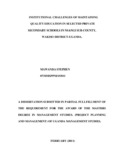| dc.contributor.author | MAWANDA, STEPHEN | |
| dc.date.accessioned | 2019-09-09T14:31:07Z | |
| dc.date.available | 2019-09-09T14:31:07Z | |
| dc.date.issued | 2011-02 | |
| dc.identifier.citation | Mawanda, Stephen (2011) Institutional Challenges of Maintaining Quality Education in Selected Private Secondary Schools in Nsangi Subcounty, Wakiso District-Uganda | en_US |
| dc.identifier.uri | https://hdl.handle.net/20.500.12305/560 | |
| dc.description.abstract | The study set out to analyze the institutional challenges of maintaining quality education in private secondary schools in Nsangi sub-county, Wakiso District. The major objectives of the study were to determine the influence of infrastructural facilities, admission criteria, leadership style and staffing on the quality of education.
The researcher used a descriptive cross sectional survey design and applied both quantitative and qualitative approaches. This study was mainly guided by the Total Quality Management theory which was derived from the teachings of W. Edwards Deming. A sample of 4 schools out of 38 was randomly selected. 35 teachers and 85 senior four students were also randomly selected. Key informants in the study included 4 head teachers who were purposively selected. 3 District officials were also purposively selected to take part in the study.
The collected data was analyzed using the Statistical Package for Social Scientist (SPSS). Pearson correlation and regression analysis were used to measure the degree, strength and direction of the relationship between variables. The findings indicated that there was a relationship between infrastructural facilities and the quality of education in private secondary schools in Nsangi sub-county, Wakiso district, the findings also indicated a significant relationship between staffing and the quality of education. However the study revealed that leadership styles and admission criteria do not affect the quality of education.
The study recommends that school authorities should pay more attention to the academic and non academic infrastructural facilities in order to develop a holistic approach to the changing trends in the education sector. That there should also be other criteria of admission to be used by schools other than academic grades and this should apply to Uganda National Examination Board. The study also recommends that there should be a clear demarcation between school directors or proprietors and the school administration. Their roles should be clearly defined to avoid overlapping and teachers should implement a holistic approach that embraces all the aspects of quality education.
Areas for further research were suggested to include the role of parents’ contribution to the attainment of quality education. | en_US |
| dc.language.iso | en | en_US |
| dc.publisher | Uganda Management Institute | en_US |
| dc.subject | Institutional Challenges | en_US |
| dc.subject | Maintaining | en_US |
| dc.subject | Quality Education | en_US |
| dc.subject | Private Secondary Schools | en_US |
| dc.subject | Uganda | en_US |
| dc.title | INSTITUTIONAL CHALLENGES OF MAINTAINING QUALITY EDUCATION IN SELECTED PRIVATE SECONDARY SCHOOLS IN NSANGI SUB-COUNTY, WAKISO DISTRICT-UGANDA. | en_US |
| dc.type | Thesis | en_US |

